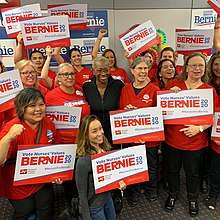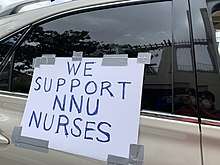National Nurses United
National Nurses United (NNU) is the largest organization of registered nurses in the United States.[2][3] The NNU, with close to 185,000 members across the country,[4] is the most far-reaching union and professional association of registered nurses in the U.S. Founded in 2009 through the merging of the California Nurses Association/National Nurses Organizing Committee, the United American Nurses, and the Massachusetts Nurses Association, the NNU focuses on amplifying the voice of direct care RNs and patients in national policy. The union's policy positions include the enactment of safe nurse-to-patient ratios, patient advocacy rights at the Executive and State level, and legislation for single-payer health care to secure "quality healthcare for all, as a human right."[5] The organization's goal is to "organize all direct care RNs into a single organization capable of exercising influence over the healthcare industry, governments, and employers."[5]
| Founded | 2009 |
|---|---|
| Members | 150,000[1] |
| Affiliation | AFL-CIO |
| Key people | Bonnie Castillo (Executive Director) Deborah Burger, Zenei Cortez, Jean Ross (Presidents) |
| Office location | Oakland, California |
| Country | United States |
| Website | www |
Leadership
The Executive Director of the national organization, which is affiliated with the AFL-CIO, is labor leader Bonnie Castillo, who also heads the 90,000-member California Nurses Association.[6] The former Executive Director is RoseAnn DeMoro, who serves as National Vice President and Executive Board Member of the AFL-CIO.
Activities
Single-payer health care
The organization backs a Medicare for All single-payer healthcare plan for the United States.[7] NNU supports the Medicare for All Act of 2019, authored by Senator Bernie Sanders (I-VT) and Representative Pramila Jayapal (D-WA), which would replace private insurance with a national health insurance system. In its statement in support of single-payer legislation, NNU said Americans pay more for their health care than any other nation "yet millions of people are uninsured or under-insured and can’t get the lifesaving care they need."[8] Medicare for All legislation would provide comprehensive health care, in patient and outpatient services, long-term care, mental health and dental and vision without insurance premiums, copays or deductibles.
According to Sanders, Medicare for All could be paid for by imposing a 7.5% payroll tax on employers and 4% progressive income tax on households, as well as by taxing capital gains and dividend income the same as wages, limiting tax deductions for the rich, increasing the estate tax and imposing a wealth tax on the top 0.1% of earners.[9] Newsweek reported that a 2018 study by Yale University, the University of Florida and the University of Maryland concluded a Medicare for All system would save the U.S. over $450 billion per year by eliminating administrative costs.[10]
To support a single-payer system, NNU leadership mobilized large-scale demonstrations demanding single-payer healthcare be included in the platform at the 2016 Democratic National Convention.[7] NNU denounced the 2016 vote of the Democratic Party Platform Drafting Committee meeting in St. Louis for rejecting a proposal in support of Medicare for All.[11] Former NNU Executive Director RoseAnn DeMoro said, "The committee has turned its back on tens of millions of Americans who continue to have no health coverage, or who are paying for health insurance they cannot use because of the prohibitive out of pocket costs."[11]
Occupy Wall Street
National Nurses United has held numerous protests, including one in front of the U.S. Chamber of Commerce and another on Wall Street,[3] to protest privatization and profiteering in the health care industry. In 2011, during the financial crisis, the NNU adopted the motto "Heal America. Make Wall Street Pay" and issued a statement[12] in support of students, clergy and others participating in Occupy Wall Street. In anticipation of police crackdowns, the NNU set up First Aid tents at Occupy Wall Street protests in San Francisco, Los Angeles, New York and Washington D.C.[13] To further address the 2011 financial crisis, NNU launched a campaign called the Main Street Contract for the American People "to create a movement—through demonstrations and legislative bills—that helps working-class people who are struggling during hard economic times. The campaign goal is to reclaim an economy with good jobs at living wages, healthcare for all, quality education, good housing, protection from hunger, a safe environment, and a secure retirement for everyone."[14]
NNU supports a tax on financial transactions, which the organization says could raise at least $350 billion a year.[15]
Support for Bernie Sanders

In The New York Times on January 28, 2016, Nicholas Confessore reported, "According to Federal Election Commission records [NNU's] 'super PAC' has spent close to $1 million on ads and other support for Democratic presidential candidate Bernie Sanders.[16] The NNU spending was classified as "Expressly advocating the election or defeat of a clearly identified candidate."[17]
In the 2020 Democratic presidential primaries, NNU endorsed Sanders, sending nurses to campaign for him in Nevada, where he won, emerging with 24 delegates and 46.8% of the vote.
COVID-19
In the wake of the COVID-19 pandemic and widespread complaints by nurses and other health care workers about lack of protection and proper protocols, NNU reports it filed over 125 complaints with Occupational Safety and Health Administration (OSHA) offices in 16 states charging specific hospitals with failing to comply with laws mandating safe workplaces.
“This is a national emergency and far too many hospitals are still failing to ensure that our caregivers who are placing their own safety at grave risk have the protections they need to stay at the bedside for their patients,” said NNU Executive Director Bonnie Castillo, RN.[18]

NNU launched a petition to the US Congress demanding nurses be provided with Personal protective equipment such as N-95 masks, gloves and gowns; education and communication from hospital and nursing home employers; and isolation rooms to safely care for COVID-19 patients.
NNU also posted a survey on its website, urging nurses to share information about their hospitals' protocols. The survey included questions about hospital screening procedures for patients with fevers or respiratory symptoms, as well as the availability of PPE and airborne isolation rooms for patients with suspected or confirmed COVID-19.
NNU asked hospital, nursing home and other relevant health care employers to do the following:
- "Employers shall implement plans and protocols in response to COVID-19 based on the precautionary principle, which holds that lacking scientific consensus that a proposed action, policy, or act is not harmful—particularly if that harm has the potential to be catastrophic—such action, policy, or act should not be implemented and the maximum safeguards should be pursued.
- Employers shall clearly communicate with all RNs/health care workers, including notifying nurses when there is a possible or confirmed COVID-19 case.
 April 13, 2020. Sign from honking Car Caravan in support of NNU nurses rallying outside UCLA Medical Center.
April 13, 2020. Sign from honking Car Caravan in support of NNU nurses rallying outside UCLA Medical Center. - Employers shall provide education and training for all RNs/health care workers, including on protective gear, donning and doffing, and all other protocols relating to COVID-19.
- Employers shall provide the highest level of protection, including functioning negative pressure rooms and personal protective equipment for nurses providing care to possible and confirmed COVID-19 cases. Employers must ensure negative pressure rooms remain functional at all times during use. Highest level of PPE must include PAPR (powered air-purifying respirator), coveralls meeting ASTM (American Standard for Testing and Materials) standard, gloves, temporary scrubs, and other protections.
- Employers shall plan for surge of patients with possible or confirmed COVID-19, including plans to isolate, cohort, and to provide safe staffing.
- Employers shall conduct a thorough investigation after a COVID patient is identified to ensure all staff and individuals who were exposed are identified and notified. Any nurse/health care worker who is exposed to COVID-19 will be placed on precautionary leave for at least 14 days and will maintain pay and other benefits during the full length of that leave." [19]
See also
| Wikimedia Commons has media related to National Nurses United. |
- California Nurses Association
References
- "National Nurses United: About". Retrieved 14 February 2019.
- "Growing National Nurses United union steps up strikes in aggressive new strategy".
- "Nurses Rally for Health Care Funding". 7 June 2011.
- "National Nurses United". Common Dreams. Retrieved 2020-04-08.
- "National Nurses United".
- "Nation Conversations: Rose Ann DeMoro on Demanding a Decent Standard of Living For All Americans - The Nation". 21 June 2011.
- Peter, Nicholas (31 May 2016). "Nurses Seek Democratic Showdown". Wall Street Journal. Retrieved 1 June 2016.
- "National Nurses United".
- "Options to Finance Medicare for All".
- "Newsweek: MEDICARE FOR ALL WOULD SAVE $450 BILLION ANNUALLY WHILE PREVENTING 68,000 DEATHS, NEW STUDY SHOWS".
- "National Nurses United".
- https://www.nationalnursesunited.org/press/national-nurses-united-statement-support-occupywallstreetorg-actions-new-york
- "National Nurses United".
- https://www.nationalnursesunited.org/main-street-contract-america
- "Nurses, Unions Propose Wall Street Tax". VOA.
- "Bernie Sanders Tops His Rivals in Use of Outside Money". The New York Times. 28 January 2016.
- "New York Times Gets it Wrong: Bernie Sanders Not "Top Beneficiary of Outside Money"". The Intercept. 29 January 2016.
- "National Nurses United".
- "National Nurses United".